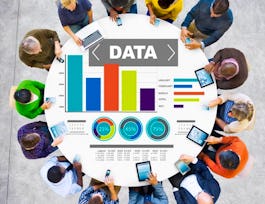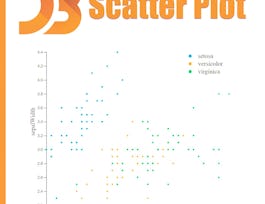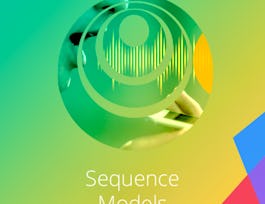By the end of this course, learners are provided a high-level overview of data analysis and visualization tools, and are prepared to discuss best practices and develop an ensuing action plan that addresses key discoveries. It begins with common hurdles that obstruct adoption of a data-driven culture before introducing data analysis tools (R software, Minitab, MATLAB, and Python). Deeper examination is spent on statistical process control (SPC), which is a method for studying variation over time. The course also addresses do’s and don’ts of presenting data visually, visualization software (Tableau, Excel, Power BI), and creating a data story.


Data Analysis and Visualization
This course is part of Data-Driven Decision Making (DDDM) Specialization
Taught in English
Some content may not be translated


Instructors: Peter Baumgartner
13,672 already enrolled
Included with 
Course
(117 reviews)
95%
Recommended experience
What you'll learn
Identify stakeholders and key components imperative to an analytics project plan
Name strengths and weaknesses of different analysis and visualization tools
Visually identify, monitor, and remove process variation
Explain how to create a compelling data story
Skills you'll gain
Details to know

Add to your LinkedIn profile
3 quizzes
Course
(117 reviews)
95%
Recommended experience
See how employees at top companies are mastering in-demand skills

Build your subject-matter expertise
- Learn new concepts from industry experts
- Gain a foundational understanding of a subject or tool
- Develop job-relevant skills with hands-on projects
- Earn a shareable career certificate


Earn a career certificate
Add this credential to your LinkedIn profile, resume, or CV
Share it on social media and in your performance review

There are 4 modules in this course
This module provides an overview of the tools needed for data analysis.
What's included
6 videos6 readings1 quiz
This module covers SPC, a way to analyze variation over time in your process using data. It is helpful in identifying current problems and can also be used to monitor the process for any deviations once the process is ‘in control'.
What's included
5 videos5 readings1 quiz
This module provides tools for leveraging data through visualization and translation.
What's included
7 videos5 readings1 quiz
This module provides an opportunity to bridge theory and practice. Learners apply knowledge from this course to solve a business problem.
What's included
1 video1 reading1 peer review1 discussion prompt
Instructors

Recommended if you're interested in Business Strategy

The State University of New York

Coursera Project Network

University at Buffalo

DeepLearning.AI
Why people choose Coursera for their career




Learner reviews
Showing 3 of 117
117 reviews
- 5 stars
77.77%
- 4 stars
15.38%
- 3 stars
5.98%
- 2 stars
0.85%
- 1 star
0%
New to Business Strategy? Start here.

Open new doors with Coursera Plus
Unlimited access to 7,000+ world-class courses, hands-on projects, and job-ready certificate programs - all included in your subscription
Advance your career with an online degree
Earn a degree from world-class universities - 100% online
Join over 3,400 global companies that choose Coursera for Business
Upskill your employees to excel in the digital economy
Frequently asked questions
Access to lectures and assignments depends on your type of enrollment. If you take a course in audit mode, you will be able to see most course materials for free. To access graded assignments and to earn a Certificate, you will need to purchase the Certificate experience, during or after your audit. If you don't see the audit option:
The course may not offer an audit option. You can try a Free Trial instead, or apply for Financial Aid.
The course may offer 'Full Course, No Certificate' instead. This option lets you see all course materials, submit required assessments, and get a final grade. This also means that you will not be able to purchase a Certificate experience.
When you enroll in the course, you get access to all of the courses in the Specialization, and you earn a certificate when you complete the work. Your electronic Certificate will be added to your Accomplishments page - from there, you can print your Certificate or add it to your LinkedIn profile. If you only want to read and view the course content, you can audit the course for free.
If you subscribed, you get a 7-day free trial during which you can cancel at no penalty. After that, we don’t give refunds, but you can cancel your subscription at any time. See our full refund policy.



